On Gold Mountain Read online
Page 10
Neither Fong See nor Ticie wanted to live in Chinatown. To settle there would have been a step backward. Instead they opened their first store on First Street, between Spring and Broadway, right in the heart of the Caucasian business center near City Hall. Once more they altered the name of the store to the F. Suie One Company, adding the initial F for Fong and an e on the end of On to make the name appear more “American.”
Although several blocks from Chinatown, the Sees lived above the store like most Chinese merchants. They continued to sell curios purchased from Charles Solomon, began to trade in baskets, and, against Ticie’s frequent objections, continued in the underwear business. The F. Suie One Company still had eight partners, but with a smaller number in the United States. Just before Fong See and Ticie had left Sacramento, Fong Quong had returned to China. Within months of settling in Los Angeles, Fong Lai had also decided to go home. Four of the partners were relatives in China; the other four worked in the store. None of them was a true partner, just employees who paid a price—either in money or in labor—to maintain their merchant status.
During these early days, Ticie—now pregnant—often felt lonely. She longed for advice and encouragement, but no Caucasian women would speak to her, and in Chinatown, men outnumbered women twenty to one. The majority of Chinese women were prostitutes living sad lives in cribs along Alameda Street. The few others were kept behind locked doors, protected like precious gems by husbands afraid to let their wives risk exposure on the street.
On May 22, 1898, within five months of moving to Los Angeles and less than two years after their marriage, Fong See went out into the night and brought back Anna Mueller, a German midwife who catered to Chinese women. The baby squalled at the indignities of his birth. Ignoring Mrs. Mueller’s protestations, Fong See peeled away the baby’s swaddling and turned him over on his belly. There at the base of his spine was his Mongolian spot. The baby may have been half-Caucasian, but to his father’s mind he was full-blooded Chinese. Fong See wanted to name his son for the great Ming Dynasty, which at its zenith had been responsible for the flowering of China’s great cultural traditions. As a name, Ming would imply brightness and intelligence.
“But I’d like to name him Milton, for my father,” Ticie said when Mrs. Mueller had rewrapped the infant.
As the child began to nuzzle at his mother’s breast, Fong See felt proud. His wife had given him a son. He could reward her.
“Milton,” he said in agreement, then added, “But his Chinese name will be Ming Fook.”
Shortly after Ming’s birth, the Sees moved to 328 South Spring Street, where the F. Suie One Company still advertised itself as dealers and manufacturers of ladies’ underwear and as a Japanese bazaar. A second son, Ray—or Ming Hong—was born on June 2, 1900. One year later the family moved to 414 North Main Street, another Caucasian neighborhood just a few blocks off what is now called Pershing Square.
The new store had three rooms. Merchandise was displayed in the front, where Ray, now a toddler, like to rest his head on the cool surface of a ceramic water buffalo that served as a doorstop during the long, hot days of late summer. From here, Ray could look out onto the street, where the scorching light seemed to bleach everything a ghostly, ashen white. In the back, the family shared a room. Across the hall, four men—“partners”—kept up the rhythmic pumping of four sewing machines.
Although the inspector for the Collector of Customs appraised the stock—Chinese and Japanese goods, as well as undergarments—at $4,000, Fong See estimated the value at closer to $25,000. Obviously the inspector didn’t know what he was looking at. By 1901, the contents of the store had evolved. By now customers could also choose from a large selection of silks and embroideries, screens, bronzes, furniture made from teak and the China nut tree, finer Chinese and Japanese porcelains, and a few high-quality antiques.
The Sees owed this change to Richard White, a former soldier of fortune, who had retired at the age of forty-five to take a job in the plumbing department of Holbrook, Merrill & Stetson. A dapper man, he carried an ivory-headed cane, and his hair had already turned white. He was more than a little smitten with Ticie. Since he couldn’t give her love, he gave her the gift of business. One day he walked in with some antiques he had bought in China years before, during his soldier-of-fortune days. “This is the kind of merchandise you should carry,” he told her. “This is what will make you different from other merchants.” Against her husband’s objections, Ticie placed the antiques in the window. Within days they were gone, and for good money.
Mr. White brought in more antiques. Once again, Ticie sold them. Still, Fong See hesitated. Curios were enough, he said. “There’s no risk in curios. We’ve always done well with them.”
“But our customers seem to want quality,” Ticie insisted. “They’re willing to pay more for something better.”
As the store’s profits increased, Fong See realized that Ticie was right. Caucasians would buy antiques, often agreeing to pay an outlandish price for something Ticie had purchased from Richard White for very little. Once Fong See and Ticie realized that they couldn’t rely on one source, they began going to auctions. Slowly the farmer’s daughter and the herbalist’s son learned how to recognize good pieces. Within a couple of years they were conducting auctions themselves, sometimes selling thousands of dollars’ worth of merchandise in a single afternoon.
Ticie made herself essential to the business. She kept the books, and researched the limited sources for Chinese antiques in the country. She was in the store every day—first with just her husband, then with Milton and Ray. Fong See was a good businessman, but Ticie had heart. There was a kindness about her that attracted people—both Chinese and American. She listened to the Chinese bachelors who worked in the store when they spoke of their wins or losses at the gaming tables. When they were sick, she sent for the doctor. When they needed someone to help them with English words, they asked her. They sought her advice when it came time to sign rental contracts for their rooms. As they prospered, they came with lease agreements for their new businesses. She helped them write letters in English, and fill out forms for their residency certificates, taxes, or fines. They depended on her judgment, and she was never too busy to help them. Although they never spoke of their loneliness, often it seemed that they just wanted to be near a woman who was both a wife and mother.
Gradually, Ticie attracted others who would become lifelong friends. Some, like Richard White, helped change the course of her fortunes as well as those of her family’s for generations to come. Besides Richard White, whose affections would always go unrequited, there was Florence Morgan, the wife of a California oyster king. Although they were still rich by Chinese standards, the best of the Morgans’ good times had passed.
Even though the Sees prospered, even though they brought in merchandise from China and sold it quickly, even though Ticie had given birth to two sons, there was one matter on which Fong See would not budge. “I would like to live in a house,” Ticie begged repeatedly. “I would like to buy property so that we can live as a real family and not just as merchants above the store.” But Fong See was only interested in what was showy, and to him nothing was more showy than an automobile.
So while Ticie worked in the store, cooked the meals, and changed and washed the diapers, her husband was being driven around town in the first automobile to be owned by a Chinese anywhere in the country. Ever the businessman, he used this car to promote a new herbalist in town. With advertisements hung on the sides and a uniformed chauffeur to drive, Fong See and the herbalist tooled along the streets of Chinatown, inviting a crowd of awestruck citizens to visit the new herb shop. Fong See would never learn how to drive, but he would maintain a consuming interest in automobiles. Cars showed the world how he, an outsider, was more innovative and open to ideas than the insiders of the city.
In 1901, after the quelling of the anti-foreign uprising known as the Boxer Rebellion, Fong See packed up his young family and took them to Chin
a for a year. He hoped to buy antiques and other goods at deeply reduced rates from people still reeling from the upheaval. To Fong See, it seemed far more difficult to leave the Gold Mountain than it had been to come here. As a boy, he had simply boarded a clipper ship and set sail. Now he needed a plethora of documents—stating who he was, who his wife was, and verifying that his children were American-born—to show that he and his family had a right to return to the United States under the merchant-class exemption.
Fong See hadn’t foreseen how tedious the process would be. He had two American-born sons and an American wife. He was recognized as a merchant by the state. Still, the way the immigration officials examined him made him feel like a coolie. He listened while his friends and associates—his insurance agent, the auctioneer, and Richard White—were questioned on his own truthfulness. None of these queries was as awkward as those surrounding Ticie.
“Is Fong See a married man?” the inspector asked Mr. Conant, the insurance agent.
“I understand that he is,” Conant replied, “but I never saw a marriage license.”
“Is he living with this woman as his wife?” the inspector asked.
“Yes, sir.”
The inspector persisted. How long had Conant known this woman? Had he seen her about the store? The inspector asked, “Have you been introduced to her as his wife?”
“No,” Conant answered. “But she has told me she is his wife.”
“Has Suie One told you that she is his wife?”
“I cannot remember that he has.”
The inspector didn’t fare much better with Richard White regarding the status of Ticie, but he painted a convincing picture of Fong See, the merchant. “Is there a laundry, lodging house, restaurant, or pawnshop connected with this place of business?” the inspector asked.
“No, sir,” White answered.
“Has this man whom you have recognized as Fong See been engaged as a huckster, peddler, fisherman, laundryman, or servant, or performed manual labor of any kind since you have known him?”
“No, sir.”
When the inspector asked how much merchandise was manufactured in the store, White answered gruffly, “Manufacturing cuts very little figure there.”
“Have you ever seen Fong See engaged in the act of making goods?”
“He has men to do that work,” White answered.
On July 23,1901, Fong See and his family received written permission from the U.S. government to travel to—and later return from—China. During their final preparations before departing Los Angeles, Fong See and Ticie had ample opportunity to go over the in-depth interrogations—the first either of them had experienced. For several years now, Ticie had been wanting her husband to get out of the underwear business. “I was right about starting the curios in Sacramento and I was right about going into antiques,” she said. “I think I’m right about this. After our interviews, I think you can see that it’s dangerous for us to continue to manufacture. We—you—would be in real trouble if the government decided you were a laborer and not a merchant.”
Finally, after all these years, Fong See agreed to give up the underwear business. The risk was simply too great. Since he no longer needed the sewing machines, he had them packed in crates to be shipped to China with the rest of the family’s luggage. He would give the sewing machines to his mother and the people of Dimtao, who would benefit from the ease of the invention, which required no electricity to operate and little training to use. The former operators, who had for so long made the underwear, stayed in the store. While Fong See was gone, they would look after things as best they could.
In September 1901, the Sees left for San Francisco, where they boarded the SS China. Ticie was filled with excitement. As a girl back in Oregon, she had never imagined that she would have the opportunity to travel to a foreign country. And China! Yet Ticie anticipated feelings of homecoming and familiarity, for she had been living as the wife of a Chinese man for four years. She wanted to explore the village of her husband’s birth, watch her children experience new sights and sounds, and meet her in-laws and her husband’s other relatives.
In October the family arrived in Hong Kong. They traveled first to Fatsan, then to Fong See’s home village. It had been thirty years since he left Dimtao. Now he stood before his parents, seeing them together for the first time since his father had left for the Gold Mountain. Shueying wept. Fong Dun Shung immediately turned his attention to Ticie, speaking a few halting words of English called up from memories dusty and worn. Fong See’s youngest brother, Fong Yun, stared openmouthed. Villagers clustered around the bearers, who had carried the family from the thriving little city of Fatsan through the ricefields to Dimtao, and watched as they unloaded the pedal-powered sewing machines.
With Fong Dun Shung leading the way, Fong See, Ticie, Ming, and Ray walked through the narrow passageways of the village. The house that Fong See had grown up in no longer existed. In its place stood a new house far grander than any of the buildings other than the ancestral temple in the village. As he stepped over the high threshold, Fong See saw that his parents’ home consisted of a large room with no windows. Outside, in the small courtyard, an open-air lean-to served as the kitchen. Almost as reflex, Fong See and Ticie picked their children up off the hard-packed dirt floor. During the coming months, they would not live here, but in another house even more primitive than this one.
“Don’t worry,” he said quietly to his wife. “Don’t worry.”
“I’m not worried, Suie,” she answered, smiling. “It’s life in the country. We’ll be fine.”
The following weeks and months bustled with all manner of activity. Ticie’s in-laws took her and the children to the ancestral temple, where she paid her respects to the ancestors of her husband’s family. Fong See had stone plaques carved with her name and those of the children, which were then hung alongside those of the many generations of Fongs from the village of Dimtao.
They each made courtesy calls: Ticie to her husband’s first wife, Fong See to his extended family. Ticie had been aware within the first week in the Sacramento factory that Suie was loyal to his family, and that each month he sent home a stipend. However, he’d never mentioned a wife. Only in preparation for this trip had he even told her about the woman. “I have been married to Yong since before I left for the Gold Mountain,” he’d said. “But you have given me sons. You are my true wife. You are my American wife.” Ticie had chosen to believe him.
Out of respect for a foreigner’s strange customs and feelings, Yong had been sent to a neighbor’s house. Stepping into the cool gloom of the house, Ticie was greeted by a shrunken old woman who peered up at her, tilting her head like a bird and looking sideways out of the corner of her eye. It took Ticie a moment to realize that this old grandmother was not a grandmother at all, but her husband’s wife.
Yong and Ticie could not communicate through words, but as they sipped their tea, the women came to understand each other. Yong, who had left her village as a young girl, had spent her life as a servant to her motherin-law. Yong only knew the drudgery of the village, and had aged far beyond her forty years. Her face had wrinkled, her hands and feet had hardened, her spine had curled, her womb had never received the seed to create sons. Although her natural inclination was to reach out to the woman, Ticie remained uncharacteristically cool. While only a concubine by tradition, Ticie was the first wife in station. Had she not provided her husband with two sons? She sat ramrod-straight. She ran her hands over her nicely tailored gown. She was the real wife here. Ticie promised that Yong’s monthly stipend would continue until her death.
Fong See was having experiences of a different sort. To return to the village of his youth was not at all what he had expected. Number One brother had died from opium. Numbers Two and Three had returned to the village after their brother’s marriage to Ticie. Number Two, Fong Lai, had married a no-name girl, and had a son and two daughters. Number Three, Fong Quong, had also married a no-name girl—this one fro
m the neighboring village of Low—and had a son. Fong See’s sister, Lin, had married Jun Quak, from Tee Chin village. Number Five, Fong Yun—who had been born after Fong Dun Shung’s return—was young, ambitious, eager. Fong See had plans for him, but they needed time to unfold.
Fong See looked for the couple who had helped send him to the Gold Mountain so many years ago, only to find that the old man had died and his wife was ailing. All these years, as the Chinese New Year came and went and others followed the custom of paying back debts, Fong See had not repaid the loan. Overcome by guilt and remorse, he promised to take care of the widow as if she were his own mother. Village gossips would discuss this event for years to come—the good deed, the amount of money that traded hands, the largesse, the honesty. In time it would seem that the whole countryside knew how Fong See had helped the old woman with—could it be true?—a gift of two thousand American dollars. The small kindness to an ailing woman would be the seed of a legend that would be tended and watered with loving care and wishful thinking. It would grow like the giant bamboo—fast and strong—the legend of Gold Mountain See.
*
Every precaution was taken to ensure the children’s health, but Ticie fell ill. She had gone to China with smooth white skin. She would go home with the scars of smallpox, or “the flowering-out disease,” as her in-laws called it. When Fong See realized the severity of his wife’s illness, he became distracted with worry. Since their marriage, he had grown to love her in a way that he could only describe as “western.” She was not a no-name girl like the wives of his brothers; he did not view Ticie as a servant or a piece of property. Over the years she had impressed him with her spirit, her independence, her strength. He hoped that these very attributes would help her as she struggled against the disease.

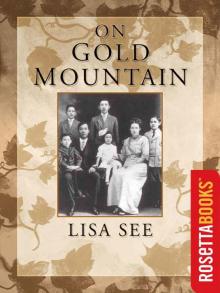 On Gold Mountain: The One-Hundred-Year Odyssey of My Chinese-American Family
On Gold Mountain: The One-Hundred-Year Odyssey of My Chinese-American Family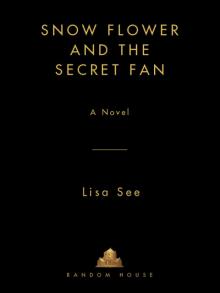 Snow Flower and the Secret Fan
Snow Flower and the Secret Fan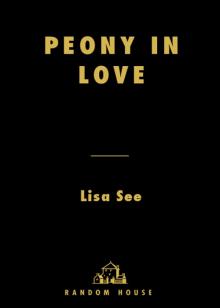 Peony in Love
Peony in Love Flower Net
Flower Net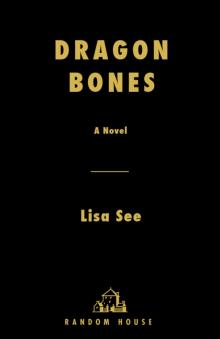 Dragon Bones
Dragon Bones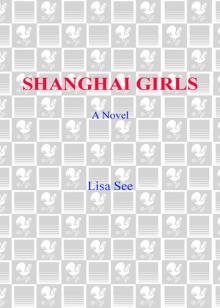 Shanghai Girls
Shanghai Girls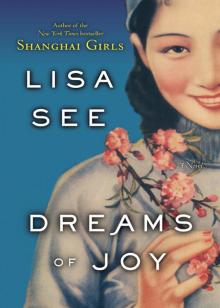 Dreams of Joy
Dreams of Joy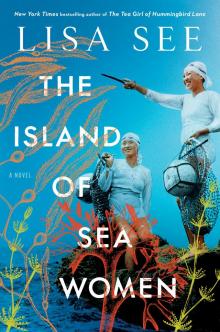 The Island of Sea Women
The Island of Sea Women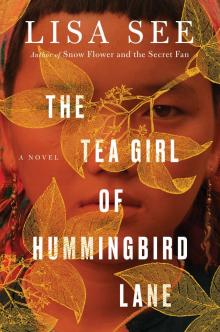 The Tea Girl of Hummingbird Lane
The Tea Girl of Hummingbird Lane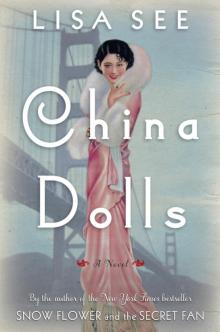 China Dolls
China Dolls The Interior
The Interior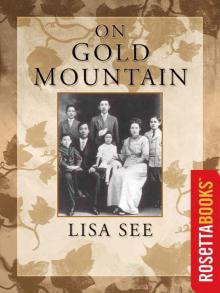 On Gold Mountain
On Gold Mountain